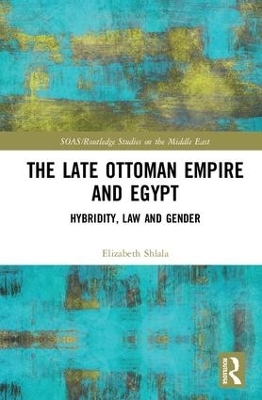
The Late Ottoman Empire and Egypt
Hybridity, Law and Gender
Seiten
2017
Routledge (Verlag)
978-1-138-71415-1 (ISBN)
Routledge (Verlag)
978-1-138-71415-1 (ISBN)
This book contributes to a vibrant strand of global history that places law and other social structures at the heart of competing imperial colonial projects- British, Ottoman, Egyptian, French and Italian among them.
Law and identification transgressed political boundaries in the nineteenth-century Levant. Over the course of the century, Italo-Levantines- elite and common- exercised a strategy of resilient hybridity whereby an unintentional form of legal imperialism took root in Egypt.
This book contributes to a vibrant strand of global legal history that places law and other social structures at the heart of competing imperial projects- British, Ottoman, Egyptian, and Italian among them. Analysis of the Italian consular and mixed court cases, and diplomatic records, in Egypt and Istanbul reveals the complexity of shifting identifications and judicial reform in two parts of the interactive and competitive plural legal regime. The rich court records show that binary relational categories fail to capture the complexity of the daily lives of the residents and courts of the late Ottoman empire. Over time and acting in their own self-interests, these actors exploited the plural legal regime. Case studies in both Egypt and Istanbul explore how identification developed as a legal form of property itself.
Whereas the classical literature emphasized external state power politics, this book builds upon new work in the field that shows the interaction of external and internal power struggles throughout the region led to assorted forms of confrontation, collaboration, and negotiation in the region. It will be of interest to students, scholars, and readers of Middle East, Ottoman, and Mediterranean history. It will also appeal to anyone wanting to know more about cultural history in the nineteenth century, and the historical roots of contemporary global debates on law, migration, and identities.
Law and identification transgressed political boundaries in the nineteenth-century Levant. Over the course of the century, Italo-Levantines- elite and common- exercised a strategy of resilient hybridity whereby an unintentional form of legal imperialism took root in Egypt.
This book contributes to a vibrant strand of global legal history that places law and other social structures at the heart of competing imperial projects- British, Ottoman, Egyptian, and Italian among them. Analysis of the Italian consular and mixed court cases, and diplomatic records, in Egypt and Istanbul reveals the complexity of shifting identifications and judicial reform in two parts of the interactive and competitive plural legal regime. The rich court records show that binary relational categories fail to capture the complexity of the daily lives of the residents and courts of the late Ottoman empire. Over time and acting in their own self-interests, these actors exploited the plural legal regime. Case studies in both Egypt and Istanbul explore how identification developed as a legal form of property itself.
Whereas the classical literature emphasized external state power politics, this book builds upon new work in the field that shows the interaction of external and internal power struggles throughout the region led to assorted forms of confrontation, collaboration, and negotiation in the region. It will be of interest to students, scholars, and readers of Middle East, Ottoman, and Mediterranean history. It will also appeal to anyone wanting to know more about cultural history in the nineteenth century, and the historical roots of contemporary global debates on law, migration, and identities.
Elizabeth H. Shlala is a fellow at Harvard University. Her work explores the nexus of modern migration and law in the Middle East. Her main research areas are two-fold: legal imperialism and colonial hybridity in the late Ottoman period and the social and economic impact of contemporary global migration.
1. 'Levant' and Levantines 2. The De Rossetti Affair 3. 'Remind Him of His Responsibilities': The Consular Era and the Mixed Courts of Egypt 4. From Italo-Levantine Subjects to 'Mixed' Nationals and Italians Abroad 5. Contested Debt, Constructed Identification, and Gendered Legal Strategies in Istanbul Conclusion and Epilogue
| Erscheinungsdatum | 18.08.2017 |
|---|---|
| Reihe/Serie | SOAS/Routledge Studies on the Middle East |
| Zusatzinfo | 1 Tables, black and white |
| Verlagsort | London |
| Sprache | englisch |
| Maße | 156 x 234 mm |
| Gewicht | 362 g |
| Themenwelt | Geschichte ► Allgemeine Geschichte ► Vor- und Frühgeschichte |
| Geschichte ► Allgemeine Geschichte ► Neuzeit (bis 1918) | |
| Geisteswissenschaften ► Geschichte ► Regional- / Ländergeschichte | |
| Geschichte ► Teilgebiete der Geschichte ► Kulturgeschichte | |
| Geschichte ► Teilgebiete der Geschichte ► Militärgeschichte | |
| Geschichte ► Teilgebiete der Geschichte ► Wirtschaftsgeschichte | |
| Naturwissenschaften ► Biologie | |
| Recht / Steuern ► EU / Internationales Recht | |
| Recht / Steuern ► Rechtsgeschichte | |
| ISBN-10 | 1-138-71415-1 / 1138714151 |
| ISBN-13 | 978-1-138-71415-1 / 9781138714151 |
| Zustand | Neuware |
| Haben Sie eine Frage zum Produkt? |
Mehr entdecken
aus dem Bereich
aus dem Bereich
auf den Spuren der frühen Zivilisationen
Buch | Hardcover (2023)
C.H.Beck (Verlag)
20,00 €
Konzepte – Methoden – Theorien
Buch | Softcover (2024)
UTB (Verlag)
39,90 €
Was Pompeji über uns erzählt
Buch | Hardcover (2023)
Propyläen (Verlag)
32,00 €


